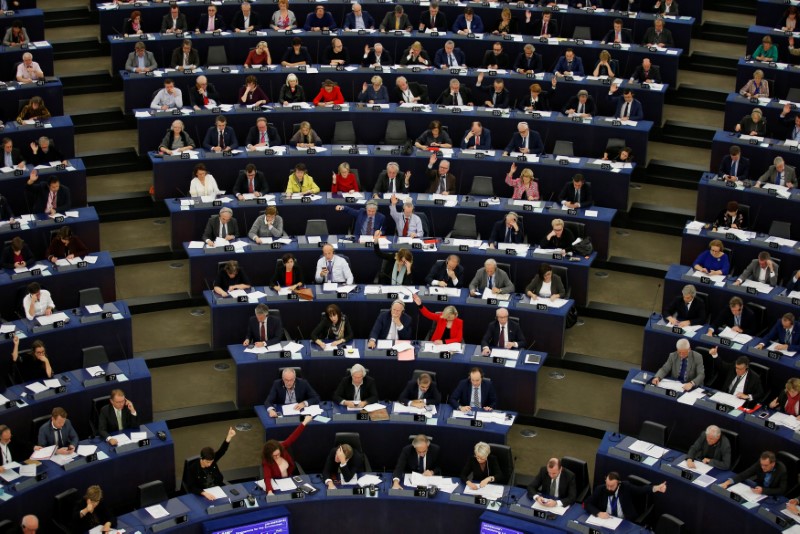By Jan Strupczewski
BRUSSELS (Reuters) - European Union leaders took a step towards deeper euro zone integration on Friday to help prevent future crises, but deep disagreement left key issues like a euro zone budget and a deposit guarantee scheme unresolved.
Leaders of all EU countries except Britain, which is to leave the bloc in March, endorsed an agreement reached earlier by their finance ministers to give some new powers to the euro zone bailout fund, the European Stability Mechanism (ESM).
But the ministers had also asked for guidance on the highly controversial idea of a euro zone budget: its size, purpose, financing or duration, and a euro zone deposit guarantee scheme that would prevent bank runs and stabilise the banking system.
Deeply divided, the leaders said they would decide on the budget size later, but noted it should be part of the wider EU budget that is one percent of EU gross national income. This is a far cry from the initial idea by French President Emmanuel Macron of a pool of money of several percent of euro zone GDP.
"It strikes a compromise with elements of the proposals of France and others. Yes, they would have liked it to go much further," Dutch Prime Minister Mark Rutte, one of the staunchest opponents of the euro zone budget idea, told reporters.
In a blow to German Finance Minister Olaf Scholz, who had wanted the budget to stabilise economies through an unemployment insurance scheme, the leaders said it should only be used to make economies more competitive and similar to one another.
The exclusion of stabilisation as a function of the budget is also a setback for the European Commission, which wanted it to support investment during crises as such spending is usually the first to be cut by governments look in a downturn.
The ESM also argued the euro zone should have a separate pool of money it could use to lend to individual countries hit by an external shock not of its own making, especially as the European Central Bank's monetary policy -- which is one for all 19 euro zone economies -- was unable to help in such cases.
"I had the impression that we are advancing, but we are not progressing rapidly enough," European Commission President Jean-Claude Juncker told a news conference.
NORTHERN OPPOSITION TO FINANCIAL RISK SHARING
The Netherlands, backed by several northern European countries and German conservatives, strongly oppose plans for the budget to be used for stabilisation, worried it would mean paying in more money to a common pot used by others. Some question the need for a euro budget at all.
Leaders asked finance ministers to work out more details of the euro zone budget, which would also be open to countries that locked their currency in the Exchange Rate Mechanism II, the euro waiting room, by June 2019, a deadline that falls shortly after European Parliament elections in May.
They are to work on the basis of the Commission's proposal from May, which mentioned a structural reform support programme that would be worth 25 billion euros and a European Investment Stabilisation Function, with 30 billion euros.
But in excluding the stabilisation use for the budget, the leaders also excluded the Commission's investment stabilisation, officials said, adding this line to the conclusions:
"The instrument will be adopted... on the basis of the relevant Commission proposal to be amended if necessary."
Juncker told the news conference the Commission would stick by its original proposal.
The leaders were also careful to avoid any direct reference to the other highly controversial topic in the euro zone integration plan, the European Deposit Insurance Scheme (EDIS).
It is the last missing element from the euro zone banking union that already features a single supervisor for all banks and a single resolution scheme for any institution that fails.
Yet Germany, the Netherlands and other northern countries fear that agreeing to EDIS now could mean they would be burdened with the repayment of deposits in countries like Italy, Greece or Portugal, where banks are vulnerable, often as a legacy of the sovereign debt crisis of 2010-2015.
After a year of talks, EU finance ministers were unable to agree even when to start discussing EDIS and, as with the euro zone budget, wanted leaders to break the deadlock.
This did not happen as leaders chose to focus on the need to reduce risks in the banking system instead and called for work to advance on the Banking Union in general, without even any direct reference to the deposit scheme.
